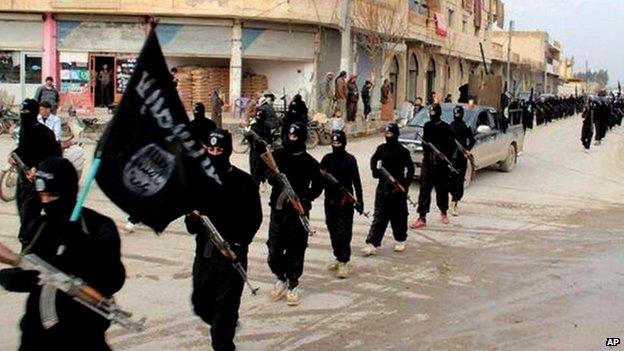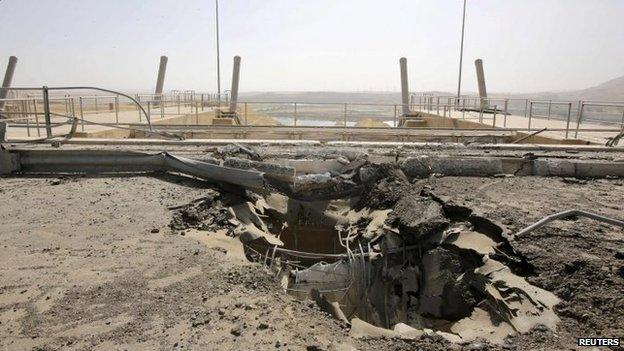Islamic State militants pose 'biggest threat' to US
- Published
US Defence Secretary Chuck Hagel: "Isil clearly poses a long-term threat''
Islamic State militants are the most dangerous threat America has faced in years, top US officials have warned.
Defence Secretary Chuck Hagel said US strikes had weakened IS in Iraq, but the group could be expected to regroup.
America's top general Martin Dempsey said IS fighters could not be defeated without attacking its base in Syria.
The conflict has fuelled sectarian tensions in Iraq. In the latest attack, dozens of people have been killed in an attack on a Sunni mosque.
Officials say that during Friday prayers a suicide bomber detonated explosives inside the mosque in the eastern province of Diyala, and gunmen fired on fleeing worshippers.
It is not clear which group carried out the attack. The area has seen recent fighting between Iraqi troops backed by Shia militias and IS, a Sunni jihadist group,
'Apocalyptic vision'
Speaking at a news conference on Thursday, Mr Hagel described IS as an imminent threat.

Islamic State militants control large swathes in Syria and Iraq

The US has carried out air strikes in Iraq since 8 August
"They are beyond just a terrorist group. They marry ideology, a sophistication of strategic and tactical military prowess, they are tremendously well-funded. This is beyond anything that we have seen."
Meanwhile, Gen Dempsey, the chairman of the US Joint Chiefs of Staff, said IS was "an organisation that has an apocalyptic, end-of-days strategic vision and which will eventually have to be defeated".
"To your question, can they be defeated without addressing that part of their organisation which resides in Syria? The answer is no. That will have to be addressed on both sides of what is essentially at this point a non-existent border."
Neither Mr Hagel nor Gen Dempsey announced a change in the limited military campaign adopted by Barack Obama, and the US president is unlikely to deepen his involvement in Iraq or Syria, the BBC's Barbara Plett Usher in Washington reports.
But US officials did not rule out additional action against IS in Iraq or Syria, our correspondent adds.
Britain said it would not work with Syrian President Bashar al-Assad in the battle against IS, despite suggestions from a retired top general that it should do so.
"What if?": The BBC's Middle East Editor Jeremy Bowen on the attack, one year on
Hunt for killer
The warnings come after IS beheaded US journalist James Foley. The US has now begun a criminal investigation into his death, with US Attorney General Eric Holder warning that the country has a "long memory".
It has emerged that a special US military mission tried but failed earlier this summer to rescue Mr Foley and other US hostages held in Syria.
In the UK, police and security services are trying to identify the jihadist who appeared in footage of Mr Foley's killing.
The BBC's Ian Pannell says finding Mr Foley's killer and bringing him to justice may be impossible
Unconfirmed reports suggest the man - who had an English accent - is from London or south-east England.
In the video of Mr Foley's murder, IS militants threatened to kill another American if the US did not stop its air strikes against the group in northern Iraq.
US air strikes have continued near Mosul despite the warning.
On Wednesday, President Obama vowed to bring the perpetrators to justice.
"We will be vigilant and we will be relentless," he said. "When people harm Americans, anywhere, we do what's necessary to see that justice is done."
Air strikes intensify
The US has been conducting air strikes across Iraq since 8 August, as part of a campaign against IS.
Jeremy Cooke reports from the front line, as Iraq forces battle Islamic State militants
US aircraft destroyed or damaged four IS vehicles and several bomb placements in strikes near the strategic Mosul Dam in northern Iraq on Thursday, the military said.
There have been a total of 90 air strikes across Iraq since operations began, the Pentagon said. Of those, 57 have been near the dam.
The US said Iraqi troops and Kurdish fighters had recaptured the dam with American assistance on Monday.
IS has waged a violent campaign in Iraq and Syria, seizing large swathes of both countries.
The violence has displaced an estimated 1.2 million people in Iraq alone.

Formed out of al-Qaeda in Iraq (AQI) in 2013, IS first captured Raqqa in eastern Syria
By early 2014 it controlled Falluja in western Iraq
Has since captured broad swathes of Iraq, seizing the northern city of Mosul in June
Fighting has displaced at least 1.2 million Iraqis
Pursuing an extreme form of Sunni Islam, IS has persecuted non-Muslims such as Yazidis and Christians, as well as Shia Muslims, whom it regards as heretics
In July alone, IS expanded dramatically, recruiting some 6,300 new fighters largely in Raqqa, an activist monitoring group said

IS presence in Iraq and Syria
